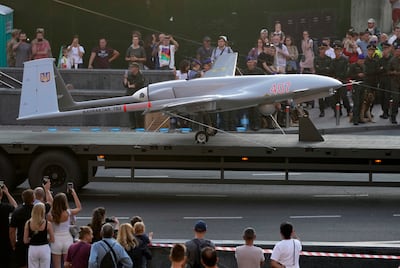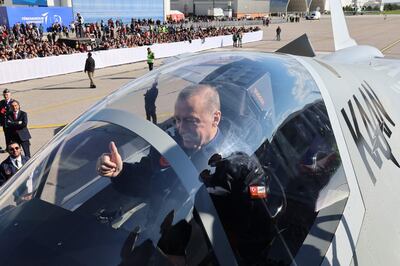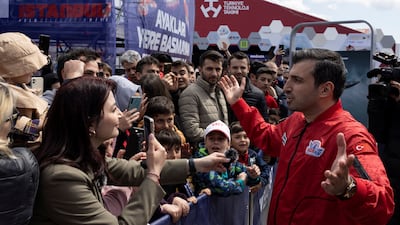Turkish President Recep Tayyip Erdogan has over the years proved to be an indefatigable campaigner. And true to form, he has overseen a major rollout seemingly every day since kicking off his campaign for the May 14 election a few weeks ago.
He drove Turkey’s first electric car and christened its first aircraft carrier. He marked the launch into orbit of Turkey’s first domestic-made high-resolution observation satellite, the long-awaited opening of Istanbul Financial Centre, and the start of natural gas production from the biggest energy field in the Black Sea. This week, he is set to visit Trabzon province to open the longest road tunnel in Europe.
But all this activity may have worn down the president, as he was nowhere to be seen when Turkey’s first homemade attack helicopter and fighter jet made their first public voyages last Tuesday. That same evening, in fact, he cut short a live TV interview as the reporter looked concerned and started to get up from his chair to come to Mr Erdogan’s aid.
The president later cited a nasty stomach flu and said he would take Wednesday off to recover, on doctor’s orders. Following widespread speculation on his health, he was back at it again on Thursday, joining Russian President Vladimir Putin online to inaugurate Turkey’s first nuclear power plant, built with Russian guidance.
Also on Thursday, Turkey’s largest defence sector event, Teknofest, kicked off in Istanbul, with activities for children and high-profile speeches and product demonstrations. The industry’s pride and joy is Baykar Technology’s Bayraktar TB2 unmanned drone, which costs a reasonable $5 million and has shaped conflicts in Syria, Libya, Nagorno-Karabakh and Ukraine, and been praised by global heavyweights such as Francis Fukuyama.
Turkey is building a TB2 production plant in Ukraine, where a police dog, a Kyiv zoo lemur, a Lviv crepe, a catchy war song, and more have been named for the drone. The TB2 led the way as Turkey’s defence exports increased more than a third last year, to $4.4 billion (Baykar delivered a quarter of that total).

Just last week, Romania agreed to buy 18 TB2s, underscoring how Turkey’s defence and industrial achievements have emerged as a campaign issue. Main opposition presidential candidate Kemal Kilicdaroglu last month argued that Turkey’s defence sector should be nationalised.
But after Baykar expressed displeasure with this view, the candidate walked back his remarks. “The stronger Turkey’s defence industry,” Mr Kilicdaroglu said last week, “the more it sits at the table, the more it becomes a state that demonstrates strength."
Apparently it was too little, too late. Selcuk Bayraktar, chairman of the board at Baykar and Mr Erdogan’s son-in-law, seemed to issue a warning to Mr Kilicdaroglu during a rare public speech at Teknofest. “He who thinks he has closed the door on the landlord stays outside,” said the handsome 43-year-old.
Thanks in part to a troubled stint as finance minister by Berat Albayrak, Mr Erdogan’s other son-in-law, Mr Bayraktar has quietly emerged in recent weeks as the Turkish president’s potential successor. Like Mr Erdogan, he grew up in Istanbul in a family with roots in Turkey’s conservative Black Sea region. He was offered a scholarship at the prestigious Massachusetts Institute of Technology, where he earned a master’s in manoeuvring unmanned systems.
Returning home to work in his father’s aerospace firm, he soon designed the affordable drone that “changed the nature of warfare”, according to The New Yorker. Mr Bayraktar has since gathered significant social and political capital, along with a measure of celebrity. He is wildly popular in Turkey, with more than 5.2 million followers on Twitter and Instagram.
In a series of Instagram posts from Turkish cities devastated by February earthquakes, he seemed to play the part – embracing children, giving comfort, pitching in at displacement camps and vowing to rebuild thousands of homes.
His social media is also filled with Islamic greetings, support for education initiatives, and photos with officials such as Foreign Minister Mevlut Cavusoglu. Mr Bayraktar’s father, Ozdemir, was a close friend of Mr Erdogan’s mentor and former prime minister Necmettin Erbakan – to whom the TB2 prototype was dedicated.

All the pieces seem to fit, which is yet another reason – in the year of Turkey’s centennial, with nationalist votes in great demand – the governing Justice and Development Party (AKP) has put industrial and defence achievements front and centre. Mr Erdogan also visited Teknofest at the weekend, appearing with Azerbaijan President Ilham Aliyev before highlighting Baykar’s achievements and announcing that the first-ever Turkish astronaut would soon visit the International Space Station.
As his main challenger shoots videos in his home office, Mr Erdogan’s regular attendance at major events and rollouts underscores the advantages of the incumbent. The president is not only a symbol of the Republic, and its leader, he is able to take credit for the achievements of Turkish businesses and occasionally offer handouts. When he opened the spigot on Turkey’s Black Sea gas field, for instance, Mr Erdogan promised Turks a month of free heating.
But the campaign focus remains nationalist pride. On the last day of Teknofest, Baykar announced that Turkey’s first unmanned fighter jet, Kizilelma (“Red Apple”), will begin production next year.
On Monday, Mr Erdogan changed his Twitter profile photo to a confident, more defence sector-friendly Top Gun-style picture. Yet, Turkey’s longtime leader has made clear that, if he does win, it will be his last term. With this in mind, the AKP may quietly want voters to know that, if Mr Erdogan were to fall ill, Turkey’s leadership would be in capable hands.
“In this day and age, the biggest change in our lives is driven by technology,” Mr Bayraktar said in an interview last year. “Who drives the changes? The ones who create technology.”


